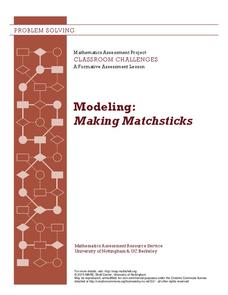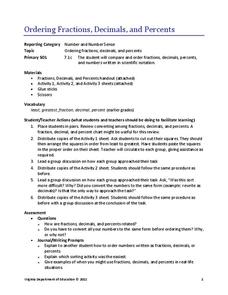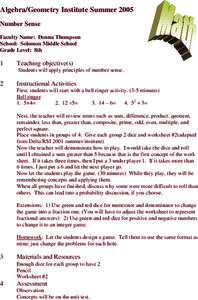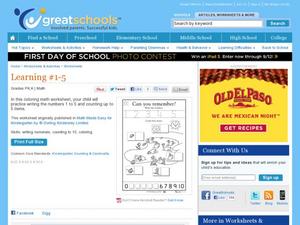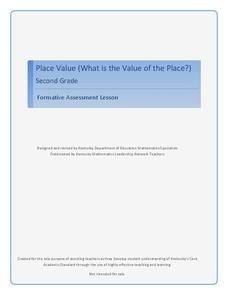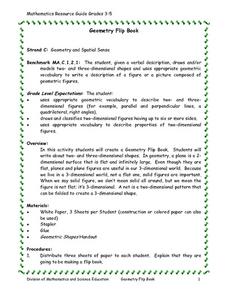Maths Blog
Adding/Subtracting Whole Numbers in Your Head
Exercise those mental math muscles! This worksheet contains 10 addition and 10 subtraction problems which require learners to compute sums or differences in their heads. A quick review at the top of the page provides a strategy based on...
Balanced Assessment
Smaller, Larger, In-Between
Build a solid understanding of rational number relationships by asking class members to use various skills to order decimals, fractions, and numeric power expressions. Using the resource, they find that the fractions do not have an...
Noyce Foundation
Rabbit Costumes
How many rabbit costumes can be made? This is the focus question of an activity that requires scholars to use multiplication and division of fractions to solve a real-world problem. They determine the amount of fabric necessary for eight...
Curated OER
Reading and Writing Numbers
Those are some long numbers! Scholars write number-form digits in word form and vice versa. The first eight are six-digit numbers and the next eight are seven-digit numbers. There are two examples to get them started. Remind scholars to...
Mathematics Assessment Project
Solving Linear Equations in Two Variables
Solving problems about pen and paper with systems of equations ... or is it the other way around? In the lesson plan, learners first interpret expressions and use equations in two variables to solve problems about notebooks and pens....
Mathematics Assessment Project
Modeling: Making Matchsticks
Math: The only subject where the solution to a problem is seven million matches. Young scholars first complete an assessment task estimating the number of matches they can make from a tree of given dimensions. They then evaluate provided...
West Contra Costa Unified School District
Factoring Quadratic Expressions
Factor in different strategies in a lesson for factoring quadratics. Young mathematicians first create tables and area models to factor quadratic trinomials into two binomials by guess and check. Learners then investigate how they can...
Curated OER
Ratios & Proportions: Introduction
In this ratios activity, students, after reviewing and discussing the definition of what a ratio is and then studying the example shown, problem solve ten multiple choice ratio math problems.
Curated OER
Mystery Number
Students explore numbers 1-100. In this cross curriculum literacy and numeration instructional activity, students listen to the book More or Less by Stuart J. Murphy. Students play a game with a partner in which they guess the...
Virginia Department of Education
Ordering Fractions, Decimals, and Percents
Order up a resource on comparing rational numbers. Scholars order fractions, decimals, and percents by converting to a single form. They conduct a cut-and-paste activity ordering three sets of rational numbers.
Curated OER
Numeracy
Students review numbers, number systems and the number operations through the use of online webpages.
West Contra Costa Unified School District
Multiplying Numbers
Provide families with the guidance needed to support their child's proficiency in multiplying numbers. Three pages offer detailed descriptions and labeled examples.
Mathematics Assessment Project
Generalizing Patterns: The Difference of Two Squares
After completing an assessment task where they express numbers as the difference of squares (i.e., 9 = 5^2 – 4^2), class members note any patterns that they see in the problems.
Curated OER
How Much Is A Million
Help young learners visualize the concept of "a million." To convey concepts of numeration and literacy, they will listen to the book How Much is a Million? by David Schwartz. They should be able to make self-to-text connections....
Curated OER
Number Line Locomotion
Here is a great lesson that incorporates movement into academic learning. Students improve addition subtraction skills by using number lines and locomotor movement.
Curated OER
Number Sense
Eighth graders participate in a lesson that is concerned with reviewing basic math concepts using the four operations. The activity is composed of a math game that is played by them.
EngageNY
Solve for Unknown Angles—Transversals
Lead your class on an exciting journey through the world of math as they review geometry facts and solve for unknown angles. They learn how to use auxiliary lines and congruent angles to correctly complete each practice problem...
DK Publishing
Can You Remember? Learning #1-5
Start from the beginning with new counters! They practice number concepts, tracing five digits: 1, 2, 3, 4, and 5. Next, scholars count the number of each object in an illustrated pond scene. How many suns? How many ducks? There are five...
Curated OER
Place Value - What Is the Value of the Place?
Second graders build number sense in an activity that requires the matching of base 10 representations to numbers. It is the teachers responsibility to gauge student understanding and involvement while class members work in groups.
Curated OER
Geometry Flip Book
Young scholars investigate the concepts of geometry that can be grouped into a flip book that can be used for teaching and review purposes. They define the differences between two and three dimensional figures. Also polygons are reviewed...
Curated OER
Morning Math / Homework Math
In this math learning exercise, students complete ten exercises reviewing basic math skills related to place value, money, time, number sense, and graphing. A Homework Math sheet is also included reviewing the same skills.
Curated OER
Identifying Ordinal Position To Twentieth
Third graders investigate the concept of putting ordinal numbers in order from one to twenty. They work in a group to hold cards with a number and then line up in numerical order. Then students recognize the number and play a game with...
Curated OER
Writing a Number Sentence
Third graders analyze word problems. In this number sentence lesson, 3rd graders evaluate word problems. Students create number sentences from word problems.
Curated OER
Chess Math
Young scholars review angles. In this geometry lesson, students become chess players on a floor chess board. When they make a move, they need to identify the angle of their movement. In the lesson plan it says the "degree" of the angle,...





